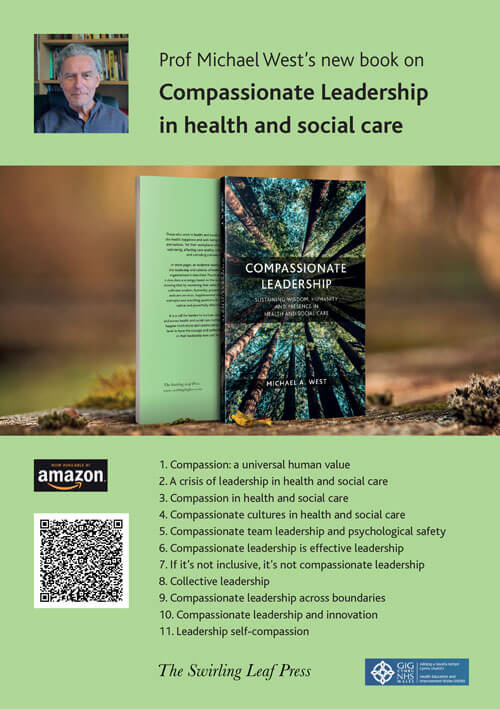Michael West has written a textbook on Compassionate Leadership, with the subtitle ‘sustaining wisdom, humanity and presence in health and social care.’ He has dedicated this book to all those health and social care staff working during the COVID-19 global pandemic, and to all among them who gave their lives caring for others, write Caroline O’Regan HMI and Dr Veronica O’Doherty Head of Psychological Division, Tallaght University Hospital.

This book provides practical applicable “tools and techniques” on the delivery of compassionate leadership. Michael has compiled decades of research and many reviews. One independent review led by Michael and Dame Denise Coia in 2019, looked ‘into the factors that impact on the mental health and wellbeing of medical students and doctors.’ The GMC published ‘Caring for doctors, caring for patients.’ ’That review was firmly based on evidence which showed clearly that staff wellbeing improved productivity, quality of care, patient safety and satisfaction as well as financial performance and sustainability.’ It has a strong focus on the workplace environment, culture and wellbeing, the source of both stressors and solutions’
Michael demonstrates through the vast body of quantitative work, evidence of compassionate leadership in health and social care and how it impacts on a range of key elements, innovation, high quality care, better health outcomes, and patient experience, thus providing a strong case as to why we should seek to develop cultures of compassion in the workplace. He also explores shared leadership and an antidote to burnout, with a range of tools on self-care and how to practically develop a team climate of psychological safety and deal compassionately with difficult behaviours.

The importance of compassion as a mediator for burn out cannot be over emphasised. Michael cogently highlights the benefits of a whole system culture of compassion which is inclusive. He discusses how a compassionate leadership culture impacts on healthcare teams to foster the safe capacity for each individual to bring ideas and concerns to the table. This will enable a safe group culture within teams without ‘group think’ which can be a negative outcome where psychological safety is absent. Being encouraged to speak out in an environment which values diverse views creates a learning space to listen to health staff who may bring different perspectives to how care is delivered. Concurrently this supports a culture of listening to learn within an organisation which allows the voice of the patient and their relatives an equally valid place.

Michael explains how a compassionate leadership model works and why psychological safety a “shared belief held by members of a team that the team is safe for interpersonal risk-taking” is important for team leadership.
Leaders create psychological safety in organisation through compassionate leadership. Compassion is attentiveness to the suffering of ourselves and others, with the wisdom and steps taken to relieve it. Michael’s detailed model of compassionate leadership highlights the four key elements of required:
- Attending: being present and listening.
- Understanding: requiring connection, dialogue and judgement.
- Empathising: feeling the difficulties or distress of the other or others and
- Helping: taking wise action to address the pain, distress or suffering of the other.
Prof. John Gilles in GPMJ draws attention to macroeconomics, and Mark Carney’s, ex-Governor of the Bank of England, in his book 2021 Value(s), the ‘values of economic dynamism and efficiency have been joined by those of solidarity, fairness, responsibility and compassion’. The added dimension Michael West’s book brings to the growing swell in literature on compassionate leadership is his focus on the view that a compassionate culture is soft and undemanding and cannot address performance issues and toxic behaviours – his overwhelming evidence shows the complete opposite. With other chapters address a general crisis in leadership in health and social care and pre-COVID stress on health system and the people who delivery the much needed compassionate care to patients and service users.
The importance of collaboration and shared vision are well documented. “Focusing on the education of future health care professionals and ethicists underscores the relevance of professionals working together, as opposed to working in silos, to adjust their focus beyond the medical model to that of health equity and social justice” (Frenk et al. 2010; Peter 2011; Sherwin 2011).” Peter & Liaschenko, 2013
(Roshi Joan Halifax sees an opportunity to improve clinician well-being CBC Radio · Posted: Dec 03, 2020 9:50 AM ET | Last Updated: December 3, 2020). Despite the difficult challenges health-care workers are facing in the pandemic — including the challenge of caring for themselves.
“We know that when systems break down, if they learn from the breakdown process, they can reorganize themselves at a … more functional level,” said Halifax.
Slaintecare the main drivers for health and social care reform and reconfiguration, adopting this approach supports the successful implementation and sustaining positive integration for cross boundary work, problem solving and delivery of our health services. Meeting the challenges of delivery health and social care means meeting people’s needs for belonging and develop and sustain trust. Leaders create effective teams and organisation cultures of psychological trust. If it’s not inclusive it’s not compassionate!. Compassionate leaders supporting staff to be more collaborative, compassionate and caring in order to effectively shape our future as health and social care organisations and the future wellbeing of those communities we serve.
There is a time for everything and everything has its time – Global COVID pandemic has reset our world. The American Minister Martin Luther King Jr said “only in the darkness can you see the stars”. This is time to reflect and future focus our relationship with leadership for health and social care in Ireland. Compassion is a universal value, irrespective of cultures but is often seen as an intangible abstract value. Michael West’s book blows that perception out of the water and presents a treasure chest and one stop guide of supports for teams and anyone working in health and social care for and with patients, clients and indeed ourselves. It is written with wisdom, humanity and passion for compassion from a great academic organisational psychologists which puts evidence to support its contents and statements.
“And I think we have an opportunity now to actually address issues in medical education that have been largely unaddressed in relation to clinician well-being and create cultures of compassionate leadership.”
There is a free on-line development course which has been launched by The Kings Fund called “Leading with Kindness & Compassion” based on the work of Michael and others. It has been co-designed with leaders across health, social care and voluntary sectors and is aimed at people at all stages in their leadership journey. https://www.futurelearn.com/courses/an-introduction-to-leading-with-compassion-and-kindness-in-health-and-social-care
Featured book
West M. Compassionate Leadership; sustaining wisdom, humanity and presence in health and social care. The Swirling Leaf Press. London, 2021.
References
- Gilles, John Book Review, Compassionate Leadership, htttps://bjgplife.com/2021/08/18/book-review-compassionate-leadership/
- Carney M. Value(s). (2021) Building a better world for all. William Collins, London.
- Edmondson, A.C., & Lei, Z. (2014). Psychological safety: The history renaissance, and future of an interpersonal construct. Annual Review of Organisational Psychology and Organisational Behaviour, 1, (1), 23-43.
- Grant. A (2021) Building a culture of learning at work – How leaders can create the psychological safety for people to constantly rethink what’s possible. Organisational & People HBR work
- Kings Fund: Bailey, S. & West, M.A. (2020) The Courage of Compassion: Supporting Nurses and Midwives to Deliver High Quality Care.
- Duhig. C., (2016) What Google Learned from its Quest to Build the Perfect Team – New research reveals surprising truths about why some work groups thrive and others falter. The New York Times: What Google Learned From Its Quest to Build the Perfect Team; Project Aristotle
- Grant. A (2021) Building a culture of learning at work – How leaders can create the psychological safety for people to constantly rethink what’s possible. Organisational & People HBR
- West, M. A (2021) Compassionate Leadership; sustaining wisdom, humanity and presence in health and social care. The Swirling Leaf Press. London.
- West. A., Coia, D.D., (2019) Caring for doctors, caring for patients. GMC, https://www.gmc-uk.org/-/media/documents/caring-for-doctors-caring-for-patients_pdf-80706341.pdf
- Woods, S. & West, M.A. (2019). The psychological of work and organisations (3rd ed.) London: Cengrage

